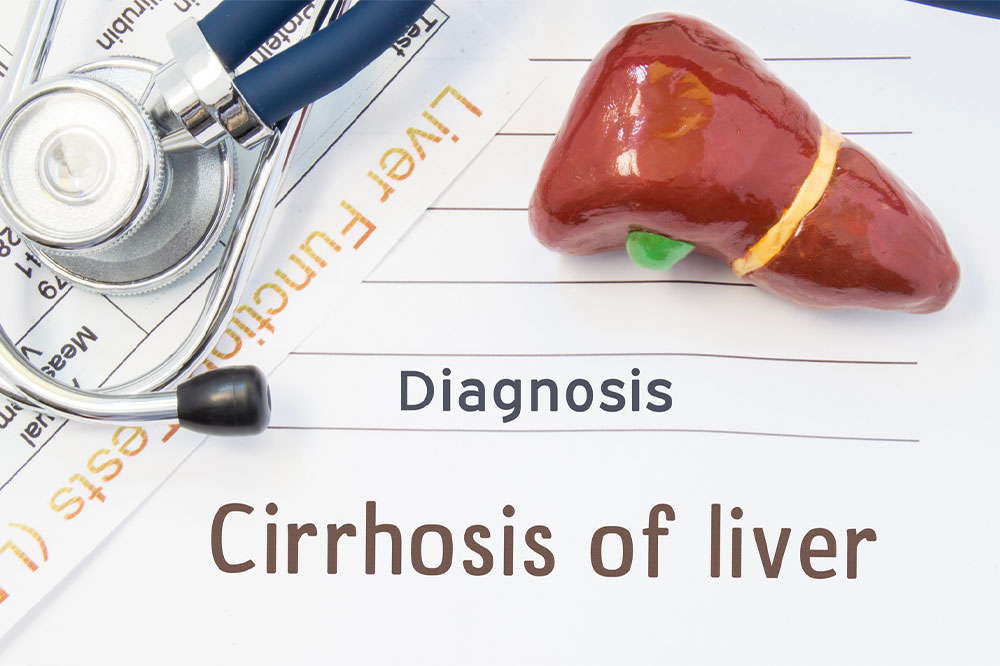Liver Cirrhosis – Its Stages and Prevention
Cirrhosis, scars on the liver, can result in liver diseases. During the early stages of the condition, some might not experience any symptoms. Conditions like hepatitis and nonalcoholic fatty liver disease are common reasons. The type and extent of treatment depend on the cirrhosis’s underlying cause. If the liver is affected, the doctors might suggest liver transplantation. Identifying the early signs of liver cirrhosis is necessary for a better prognosis.

What is cirrhosis of the liver?
A late-stage liver condition called cirrhosis causes the liver to become irreversibly damaged when the good liver tissue is replaced with scar tissue. As a result, the liver cannot function correctly. Numerous liver disorders and diseases harm healthy liver cells, leading to cell death and inflammation. When the body starts the process of cell repair, it turns into tissue scarring.
The scar tissue reduces the liver’s capacity to handle nutrients, hormones, medicines, and natural toxins and limits blood flow through the liver (poisons). Additionally, it reduces the liver’s ability to produce proteins and other chemicals. Over time, cirrhosis prevents the liver from functioning normally. Cirrhosis can be fatal in its advanced stages.
Can cirrhosis be reversed?
Cirrhosis is diagnosed when the liver disease is in its advanced stage, and the harm done is already irreversible. However, it also depends on the stage of liver cirrhosis. Several liver disorders and the consequences of liver diseases can develop into cirrhosis. The progression of the liver illness or complication may be slowed down or stopped if it is identified early and successfully treated.
Stages of liver cirrhosis
A doctor will diagnose the condition and identify the stage of liver cirrhosis. They’ll describe the liver as either “compensated” or “decompensated,” depending on how well it’s functioning. The type of care received thereafter depends on the doctor.
Compensated cirrhosis
People with compensated cirrhosis mostly will not have or show any symptoms, as there are enough healthy cells in the liver to compensate for the damaged cells and scar tissue brought on by cirrhosis. The liver can still perform its function, and this stage can last for many years.
Decompensated cirrhosis
The stage that follows compensated cirrhosis is known as decompensated cirrhosis. By this time, the liver has developed difficulties due to excessive scarring. If someone exhibits symptoms of one or more of these disorders, a doctor will diagnose them with decompensated cirrhosis.
What to expect with cirrhosis?
Cirrhosis typically can not be reversed once the damage has been done. However, the remaining third of the liver can still function and recover even if two-thirds have been damaged or removed. If long-term hepatitis is the root cause of cirrhosis, treating the virus can reduce the risk of developing more issues if discovered early. Most persons with cirrhosis who are diagnosed in the early stages of the disease can lead normal lives.
The liver may have already suffered irreparable harm. However, the liver is a sizable organ. Depending on the source of the disease and how much of the liver is still functioning, the affected person may be able to slow the disease’s course. Managing a healthy weight and controlling blood sugar is necessary if someone has diabetes or has an unhealthy amount of weight.
It is best to talk to a healthcare professional or practitioner to help identify the root cause of cirrhosis and any potential complications that may have developed as a result. After that, decisions about the best treatment for liver cirrhosis can be discussed and implemented.
Prevention of cirrhosis
Take precautions to avoid hepatitis
The most frequent cause of this liver inflammation is a virus. Hepatitis A, B, and C are the three most prevalent viral hepatitis, and cirrhosis may result from chronic hepatitis B or C. A person can contract hepatitis B via sharing blood, semen, or other bodily fluids. However, blood-to-blood contact is the main way that hepatitis C spreads. The likelihood that a person may develop cirrhosis increases if they have chronic hepatitis C.
Get vaccinated
If someone who works in medical, law enforcement, or any other field where they could interact with hepatitis-positive individuals, they should consider getting vaccinated against hepatitis B. Unfortunately, there is no hepatitis C vaccination.
Cirrhosis of the liver causes many liver diseases and complications. This is because the liver fails to work as it should due to scarring. Many processes and activities that keep a person healthy are because of the liver, so it is essential to take care of the organ. Even though liver scarring damages the body permanently, having a long life is conceivable with timely treatment, lifestyle changes, and balanced meal plans. Depending on the underlying reason, it may be feasible to prevent or reduce the progression of cirrhosis.